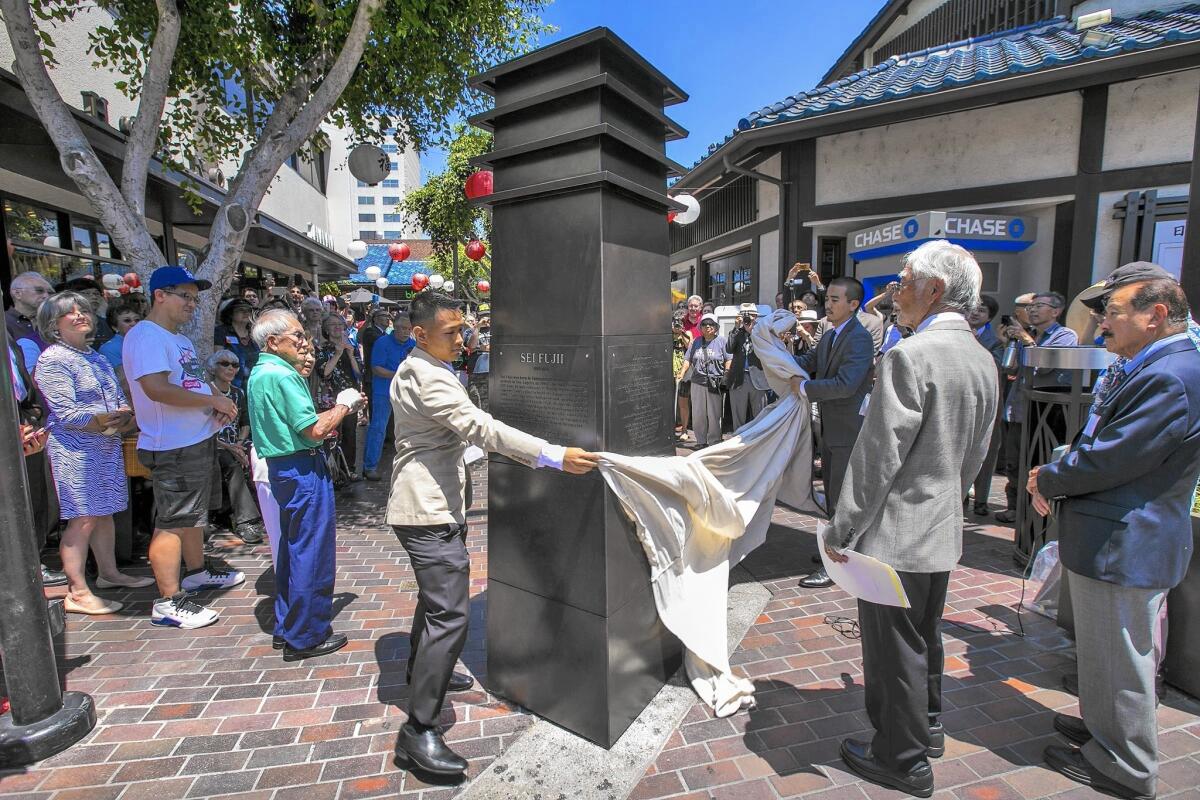Little Tokyo monument honors Japanese immigrant activist Sei Fujii

- Share via
Sei Fujii immigrated to America in 1903 and graduated from USC’s law school in 1911, knowing full well that, as a noncitizen, he would not be allowed to take the bar and practice as an attorney.
Undeterred, Fujii partnered with a like-minded white classmate, J. Marion Wright, and worked for more than four decades to overturn racially discriminatory laws that prohibited Japanese residents and their descendants from participating fully in the American dream.
Fujii is scarcely remembered today, even by Japanese Americans, but on Saturday, a group of his admirers, including leaders of the Little Tokyo Historical Society, unveiled a monument in his honor at the entrance to the Japanese Village Plaza in Little Tokyo.
“Sei Fujii contributed greatly to the lives we live today,” said Jeffrey Gee Chin, a budding filmmaker and USC graduate student whose half-hour film “Lil Tokyo Reporter” recounts an episode from Fujii’s life as a crusading newspaper publisher.
In 1931, Fujii began publishing the California Japanese Daily News, a bilingual paper, to help inform and unite the growing immigrant community in prewar Little Tokyo. The next year, he was shot by Japanese gangsters whose crimes the newspaper had exposed.
A first-generation Japanese immigrant, or issei, Fujii was born in 1882 in Yamaguchi Prefecture in Japan.
The 8-foot-tall, galvanized steel monument to Fujii is in the form of a lantern like those found in his home village. It was created by Miles Endo, a Rhode Island designer who grew up in Honolulu and spent many summers exploring the streets of L.A.’s Little Tokyo while visiting family.
Carole Fujita, a founding member of the Little Tokyo Historical Society, became fascinated by Fujii’s life in 2008 and later enlisted Chin to direct the short film. Chris Tashima, an actor with a Gregory Peck aura, portrays Fujii.
One of Fujii’s and Wright’s biggest accomplishments, Fujita said, was a U.S. Supreme Court victory in 1929. The ruling allowed issei doctors in Los Angeles to incorporate and build a hospital in Boyle Heights to serve the Japanese community. Fujita was born there.
After the Japanese attack on Pearl Harbor in 1941, Fujii was among the first issei incarcerated in a high-security internment camp in Santa Fe, N.M.
After his release, he bought a small property with the intent of challenging the California Alien Land Law that prevented noncitizens like him from owning land. He and Wright fought the case to the California Supreme Court, which in 1952 ruled the law unconstitutional. The ruling put an end to racial discrimination in holding real estate and permitted Japanese immigrants to own homes and other real property.
In 1954, 51 years after his arrival in the United States, Fujii finally became a citizen. He died at 72 of a heart attack 51 days later at a Buddhist temple after delivering a eulogy for a man who had helped fund the construction of the Japanese hospital.
Twitter: @MarthaGroves
More to Read
Sign up for Essential California
The most important California stories and recommendations in your inbox every morning.
You may occasionally receive promotional content from the Los Angeles Times.











